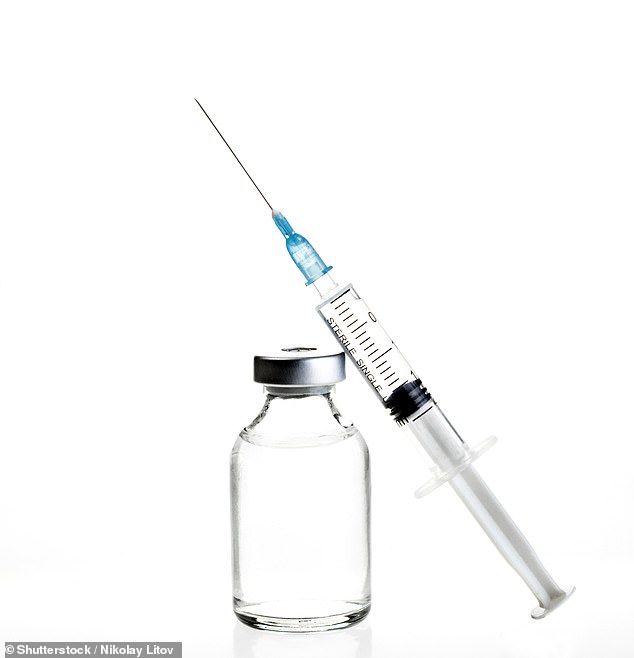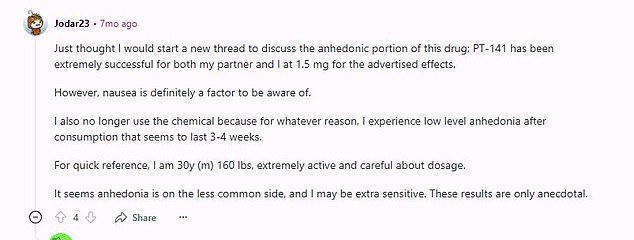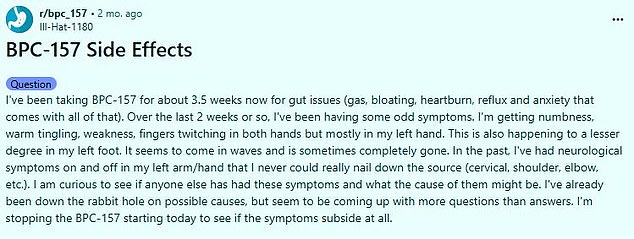A trendy ‘anti-ageing’ treatment hailed as ‘better than Botox or Viagra’ is raising alarm among medical experts who warn it may trigger heart issues and even cancer.
Peptide therapy — available as tablets or DIY injections — is gaining traction among middle-aged men looking to build muscle, boost energy and stay mentally sharp.
Once limited to elite athletes and bodybuilders, it has now gone mainstream thanks to celebrity hype and social media influencers.
Tech mogul Bryan Johnson — famed for spending millions in a quest to reverse his biological age — has championed the treatment, and podcaster Joe Rogan claims a peptide jab cured his elbow tendonitis in two weeks.
Users online describe improvements in gut health, mental clarity and injury recovery while taking peptides.
But scientists say there’s little robust evidence to back these claims and mounting concern about long-term safety.
They warn that, while some peptides may have legitimate medical potential, the unregulated cocktails now being marketed online comes with serious unknowns.
Peptides are tiny strings of amino acids — the building blocks of protein — that occur naturally in the body and act as chemical messengers.

Podcaster Joe Rogan has previously claimed that a peptide injection cleared up his elbow tendonitis in just two weeks.

Bryan Johnson uses peptides but says that the therapy is ‘experimental’
They help regulate everything from growth and digestion to brain function and immune response.
Scientists can now create synthetic versions in the lab.
Some mimic naturally occurring peptides such as insulin or growth hormone and are used as licensed medicines.
However, others are designed to imitate or enhance different bodily functions, such as healing tissue or reducing inflammation.
These are often unapproved, poorly studied and sold online as ‘supplements’ or ‘research chemicals’, allowing sellers to bypass strict drug regulations.
This legal grey area allows forms to market powerful compounds directly to consumers, without the safety checks required for licensed medicines.
Some of the boldest claims about peptides are being shared on Reddit forums and in online marketing, where users describe them as ‘Botox in a bottle’ or ‘Viagra for the brain.’
PT‑141, a compound originally developed for sexual dysfunction, is promoted as an alternative to erectile dysfunction medications, said to boost desire without affecting blood flow.

A growing number of men are exploring the use of peptides, which are injected using a syringe, for anti-ageing (stock photo)
One Reddit user on a forum for erectile dysfunction claimed: ‘PT-141 really is insanely powerful…’
Another added: ‘PT‑141 is actually legit, but most people don’t know how to use it properly. It’s not like Viagra or Cialis, it works on the brain, so the effects feel way different.’
Meanwhile, a wave of over-the-counter topical peptides are being marketed as having an effect similar to anti-wrinkle injection Botox.
Ingredients like Argireline and SYN-Ake — found in high-street brands including The Ordinary and Medik8 — are said to relax facial muscles and smooth out lines, mimicking the effects of Botox without the need for needles.
Others turn to peptides like BPC-157 and TB-500 in what’s been dubbed the ‘Wolverine Stack’, in reference to the comic book character’s ability to rapidly heal – with even more startling effects.
One Reddit user recovering from nagging knee pain shared: ‘I was feeling pretty hopeless… PT [personal training], stem cell therapy, massage, supplements, rest, ice, flexibility training—nothing helped.
‘Now I’m landing front flips on a trampoline, kick-flipping a skateboard and front-squatting 150lbs for reps without pain.’
Experts, however, caution that most of these claims are anecdotal and unproven—and warn that using unregulated peptides could carry serious long-term risks.




Some of the boldest claims about peptides are being shared on Reddit forums and in online marketing, where users describe them as ‘Botox in a bottle’ or ‘Viagra for the brain’
Professor Adam Taylor, director of the Clinical Anatomy Learning Centre at Lancaster University said: ‘There are certainly risks to taking these drugs, that people need to be aware of.
‘Including increased heart rate, damage to cells and potentially neurological damage.’
Calls are now growing for tighter regulation of the rapidly expanding peptide market, as demand continues to outpace the science.
‘In theory you can see why people are persuaded to take these drugs,’ said Professor Taylor.
‘Peptides are a valuable resource in the body — which makes its own — for growth and repair so you can see how users think they will be able to help with ageing.
‘We do know that peptides can boost collagen production, which will help improve the appearance of skin and renew tissue to help with recovery.
‘Which is why clinically tested formulas are already used in skincare products.’
However Prof Taylor believes that anyone taking BPC-157 or TB-500 could be putting themselves in danger.
‘The issue is that people often take these drugs for an isolated reason, for example to treat a knee injury, and we do not know for certain the effects that they are having elsewhere,’ he said.


Alongside the stories of remarkable benefits and recovery, Reddit users also share negative experiences on forums
‘Users are likely to suffer from heart problems as they will suffer from an increased blood pressure and heart rate.
‘Other possible side effects include nausea, dizziness and stomach problems as well as the possibility of suffering from an allergic reaction.’
Alongside the stories of remarkable benefits and recovery, Reddit users also share negative experiences on forums.
One BPC‑157 user described: ‘I took it for two days then the morning after I had a horrible headache and felt nauseated… Took it for three days and the fourth morning woke up with awful headache and nausea again. Felt somewhat similar to a horrible hangover.’
Another wrote: ‘I had side effects—fullness in the chest and liver damage. Still working on the problem. No heart problems but it feels like it.’
A third user shared: ‘Abdominal pain, brain fog, major fatigue, irritability, feels like I can’t digest food… Pain in my left side top abdominal was getting bad.’
More seriously, one individual reported neurological symptoms after several weeks of use: ‘I’m getting numbness, warm tingling, weakness, fingers twitching in both hands but mostly in my left hand.’
Users of PT‑141 also warned of unpleasant reactions. One posted: ‘Nausea is definitely a factor to be aware of… I experience low-level anhedonia [loss of motivation and interest in activities that were previously pleasurable] after consumption that seems to last 3–4 weeks.’
Experts say that the problem is that while peptides have been tested on animals, there have been few human trials to test their safety.
‘The crux is that these are unlicensed treatments that have not been properly tested and we really do not know the long term side effects,’ says Professor Penny Ward, a pharmaceutical specialist at Kings College London.
‘There is a cancer risk — these drugs can stimulate tumour growth. If a person had a small tumour they were not aware of, it could fuel the disease.
‘And we can not rule out whether these drugs can themselves cause cancer.’
Experts say that anyone still considering peptides should do so under medical supervision, and never self-prescribe the supplements.
‘If you are considering these treatments, check with a qualified professional that you do not have any underlying health conditions, as these drugs will likely exacerbate them,’ said Prof Taylor.
‘At the same time you need to be keeping in regular contact with a doctor who will be able to monitor any side effects you may be experiencing.
‘But really no one should be self prescribing these drugs, especially just in the hope of looking younger.’
Although experts warn against taking the drugs at the moment, some suggest there is potential for them to be used for anti-ageing in the future.
‘Some of these peptides are beginning to be studied,’ added Prof Taylor.
‘So I could see a future when these do become a recognised treatment that is widely available, but we are not there yet and currently they are not safe.’












